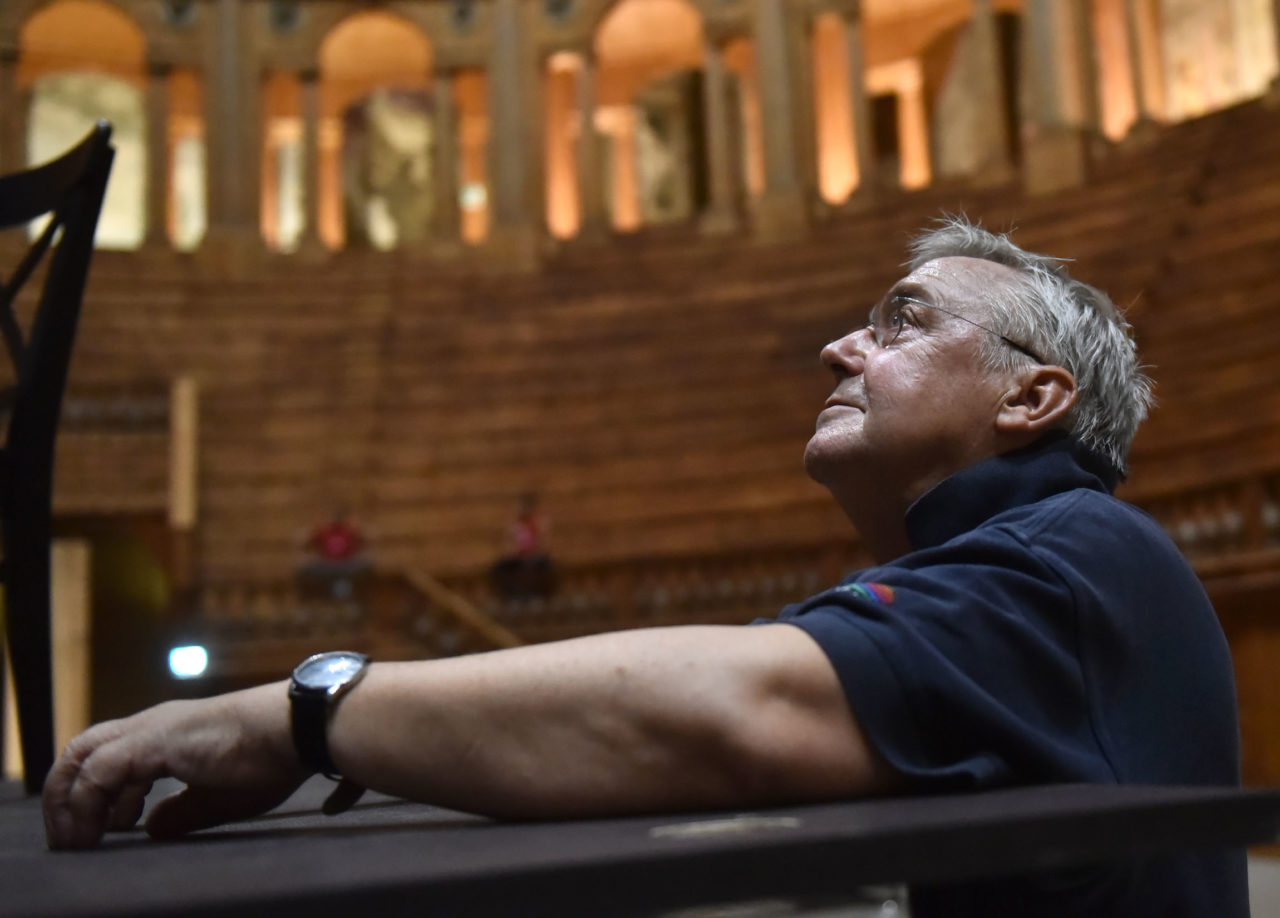It is difficult, if not impossible, to express anything meaningful in relation to the death of director Sir Graham Vick. Tributes are filling social media, many written by artists with whom the 67-year-old CBE-honoree worked throughout his illustrious four-decade-plus career, and amidst them, palpable veins of grief and anger, cries of “too soon” (Vick died of complications from coronavirus) and heartbreaking expressions of bewilderment. Imagining the opera landscape without Vick’s voice, literally and figuratively, is a very strange endeavour. To say he changed the centre of opera-theatrical gravity is putting things too mildly; he changed the entire universe, and many would argue, for the better.
Vick was a strident believer in opera being an art form for everyone, and was a champion of experimentation, risk, and diversity. Named director of productions for Scottish Opera in 1984, Vick went on to Glyndebourne, where he was director of productions from 1994 to 2000. He founded Birmingham Opera in 1987 and remained its artistic director. He helmed the works of Shostakovich, Britten, Wagner, Mozart, Monteverdi, Mussorgsky, Schoenberg, Rossini, and Prokofiev; he collaborated with a number of contemporary composers including Karlheinz Stockhausen, Luciano Berio, Ravi Shankar, Jonathan Dove, Stephen Oliver, and Georg Friedrich Haas, and had several projects planned (including production of new commissions) across the U.K. and Europe. To say he was modern is too cliched; to say he will be forgotten is impossible. The recollection of seeing – nay, experiencing – his work live now, at a time when so much of the live experience has been shuttered and is dictated by perceptions deeming opera elite, irrelevant, a frill, a fringe, a frippery, is to recall the work of a man who not only knew better, but proved it.
In 2017 I had intended to interview Vick about his award-winning production of Stiffelio at the Festival Verdi in Parma. That conversation unfortunately never took place (alas, poor timing), but I will always remember walking slowly away from the Teatro Farnese one warm night in October feeling as if I was seeing the world with entirely new eyes; the dim street lights that outlined the jumbles of boys gathered on street corners, the shouting, the darts back and forth to groups of girls, the hand-holding couples, the older woman stopping and starting along one wall, catching her breath… everything was familiar, strange, distant, immediate. Good theatre is meant to have this effect, of genuinely changing one’s perceptions and experiences of life outside of the theatre proper (I think), of cultivating curiosity and encouraging some form of empathy (or maybe “observation” is a more appropriate term here, considering Vick’s staging) – my experience of such art, of such direct and unfiltered theatrical approach, had been rather limited up to that point, and in the case of opera, I’d become inured to blithely sitting and gawking in silky finery, my senses more attuned to the orchestra and the voices; my expectations had, with very few exceptions, been unconsciously lowered around visuals and visceral understanding, an experience I only became aware of through the direct immersion (quite literally) in Vick’s production. His vision, as with so much of his oeuvre, demanded immediacy, contemplation, interaction, even (sometimes) direct engagement – with words, music, sounds, action… feelings. His stagings weren’t lessons (nor were they meant as such) but were very often challenges – to whatever baggage we may have brought, consciously and not. Stiffelio forced me to throw out that baggage, to set it alight; as the daughter of a confirmed Verdi lover, Vick’s intentionally confrontational production was not the medicine I necessarily wanted at the time, but was precisely the dosing rather desperately needed, and at some unconscious level, deeply desired.
This year’s edition of Festival Verdi will be dedicated to Vick’s memory; it opens on September 24th with a production of Un Ballo in Maschera, helmed by director Jacopo Spirei and based on an original project by Vick. The administrative and artistic teams at the Teatro Regio di Parma and Festival Verdi (including General Director/Artistic Director Ana Maria Meo and Music Director Roberto Abbado) stated in a formal release that “(t)he world of music and theatre loses an artist with a sharp eye, extraordinary sensitivity, attention to young talent, the ability to bring to light the hypocrisies and inconsistencies of our lives on the notes of scores written centuries ago, the ability to discover opera and make it loved by the broadest communities far from the world of culture, highlighting the values, feelings, and themes that bind it so closely to our contemporary world, our everyday life.”
Mille grazie, Graham, per tutto. x

Graham Vick rehearsing Stiffelio in 2017. Photo: Roberto Ricci / Teatro Regio di Parma
From Graham Vick’s January 2021 chat with Oxford Contemporary Opera:
“The aim is to have people not be prejudiced about the word (“opera”), to not change the word… isn’t that the job, really? I mean, Luciano Berio, he called the first one I did, Un re in ascolto (A King Listening), he called it a “musical action”… (and) in the late 20th century, everybody was trying to find a new label, (everybody) was experimenting with non-narrative opera […] but there’s nothing wrong with opera. Opera has this incredibly rich, 400-year history, and the only thing wrong with the word is the prejudice.”
“I believe that opera is its own art form, and it’s a huge art form, but it’s based on singing; that’s where its expressive heart is, is in singing. And the sung word, the human voice, is the most natural. When someone is singing good and open and in touch with themselves, (it) is the most immediate conduit to the human soul.”
“Everybody wants the star delivering the material… and that is fundamentally anti-theatric. It means, in fact, they perform their brand – in modern parlance – […] and so you might begin – here I’m being very rude, but I’ll say it anyway – you might begin by thinking The New Tenor is really interesting and fascinating, then by his fourth or fifth role you’re beginning to say, “It’s a little bit stuck and mannered” and eventually you’ll think, “That’s all he’s got to offer”… but it’s saleable, it’s packageable, because it’s a groove that sells recordings, that goes with someone who’s found his public. Many people fall into this rather disappointingly narrow track. The liberation of singing, the fact it should go all the way through the whole of your persona, the whole of your physical and psychic persona… the sound should resonate through it all… the people who are capable of living and communicating through that sound are the true high priests and priestesses of the art form.”
“There’s no substitute for understanding the words.” (referring to the English translation of operas)
“You can get the chorus of La Scala to do the most phenomenal mezzo-voce/mezzo-piano in the middle register – magic, like you’ve never heard. And that’s utterly beautiful. But if you want to hear the voice of the Russian people crying in despair and anger about religion and about politics, if you hear what we do in Birmingham, it speaks an entirely different way: devoid of polish, devoid of sophistication, devoid of training, but direct from the soul, direct from the heart, and meaning being 100% what they’re doing, not meaning via technique, via beauty, via sound, via keeping-everybody-else-happy. It’s unique. And that is a different way to deliver art. Prosciutto crudo, not prosciutto cotto.”
“The mess of opera and this pandemic is, of course, enormous, because not only the pandemic but with, of course, Black Lives Matter, and what’s happened this year, and so really for the first time a lot of people are finally taking diversity as a serious issue… but not really, of course, because they’re not really doing their proper work at the moment, they’re doing small projects, (with) small audiences. So it’s quite easy to change the apparent face very quickly. The truth is, when we come out (of the pandemic), we’ve now discovered – I believe everybody has now discovered, what we’ve always known in Birmingham – which is, we should be performing for the whole city; that’s what our work is and for, but our tickets cost £17.50, for everybody […] that gives us a completely different audience. I read statements on the websites of theatres, policies about equal opportunity and so on, but I don’t think we can fool ourselves that there is any possibility of any kind of equality, any kind of cultural democracy, unless people can afford to buy a ticket. And I think that is going to be an enormous problem, because the money is tight.”
“We have to include a much broader community in what we produce, in how we produce it, in how we communicate its truths, and in who we put on our stages, in our pits, in our choruses, in who you see around you in the audience – all of this has to change in order (for opera) to have any validity. But I don’t see, at the moment, any artists leading that charge. And I think it has to be an artistic charge.”
“What happens is, gifted, talented people start(ing) off initially as angry as me get sucked into this amazing thing that is opera – this big, soupy glorious, glamorous, thrilling world – and they lose their judgement. They lose their social and political judgement, and turn their back on where they came from. So that’s the message for you all, and what I want to say: be true to yourselves. Because the world has to be changed.”
“There are many, many ways of defining the word “excellence”.”

2 Pingbacks